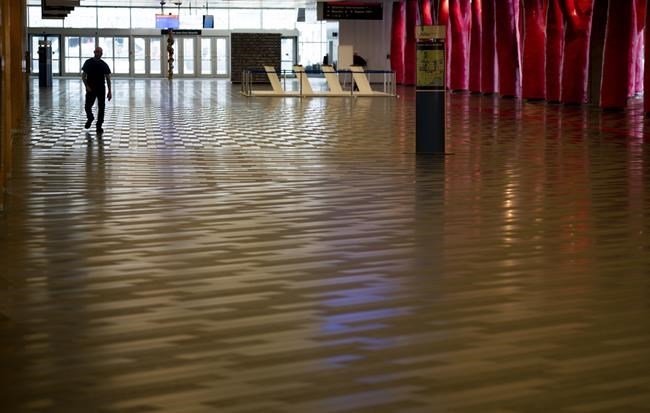The cancellation of business conferences and conventions across the country is costing cities hundreds of millions of dollars in lost revenue as the COVID-19 pandemic devastates the tourism industry.
Tourism Toronto says the city will be down 120,000 business visitors from April through June as major events such as the Collision tech conference are cancelled or postponed, depriving the metropolis of an estimated $250 million in spending.
"Right now we have hotels in the single-digit occupancy range, borders closed and stay-home orders so visitor spending is effectively shut down," said Andrew Weir, the marketing organization's vice-president of destination development.
"This is a complete halt to the tourism economy," he said, with "all major meetings" now nixed.
With virtually no leisure travel, the suspension of all in-person business gatherings is taking a multimillion-dollar bite out of an already suffering sector.
Last week barely 5,000 passengers arrived at Canadian airports from the U.S., down 99 per cent from a year earlier, according to the Canada Border Services Agency.
Hotel occupancy rates sit below 10 per cent on average, prompting more than 4,100 closures and 250,000 layoffs across the country — 83 per cent of the industry workforce — the Hotel Association of Canada said.
"They’re the people that open doors and clean rooms and do all the things that are so essential to making that stay memorable and enjoyable, so it’s very difficult to see so many people affected like this," Weir said.
Tourism Montreal says at least 70,000 hotel bookings and $55 million in sales will evaporate in the second quarter after more than 120 business events — including the National Hockey League draft — were pushed back or called off.
Yves Lalumiere, the marketing organization's CEO, said events with just a couple of thousand attendees can boost the local economy, particularly in the low season, making their absence "hurt" all the more.
Many events have been postponed until 2023 or 2024, such as the 10,000-attendee International Society for Heart and Lung Transplantation, initially scheduled April. Others such as the International Economic Forum of the Americas' Montreal conference, originally slated for June, are now on the calendar for December.
Vancouver is facing a similar crisis, with 84 business bookings cancelled through December amid ongoing border shutdowns and bans on group gatherings, according to its tourism association.
The ripple effect reaches beyond the hospitality sector to hit small businesses.
"Obviously, hotels and restaurants are affected to their very core," Weir said. "But the reality is when meetings and conventions don’t happen, that affects audio-visual companies, it affects transportation companies, it affects staging companies and the entertainers, the musical acts and professional M.C.s that are hired to host these events."
About one-quarter of the $10 billion in economic activity generated annually by tourism occurs in the second quarter, with "nearly all of it" now lost, he said.
Weir worries that while pent-up demand among locals for restaurants, attractions and nightlife will help fuel a recovery once restrictions start to lift, a wariness of travel has set in among would-be tourists that could be hard to shake in 2020.
"We’ve all been in our house for weeks upon weeks, and what will soon be several months,” he said, "but the pace of getting comfortable with moving and flying again just isn't known right now."
This report by The Canadian Press was first published April 28, 2020.
—With files from Julien Arsenault
Christopher Reynolds, The Canadian Press

